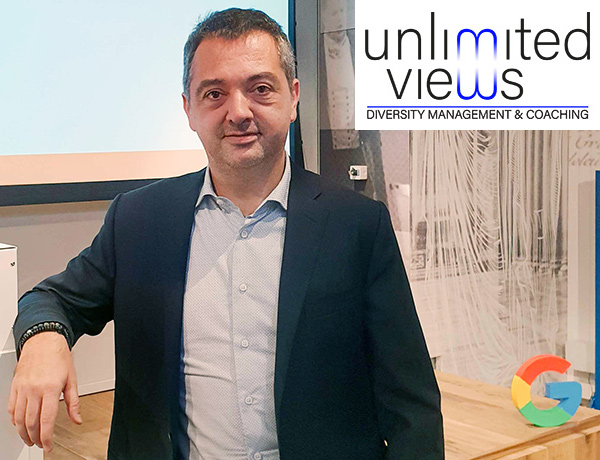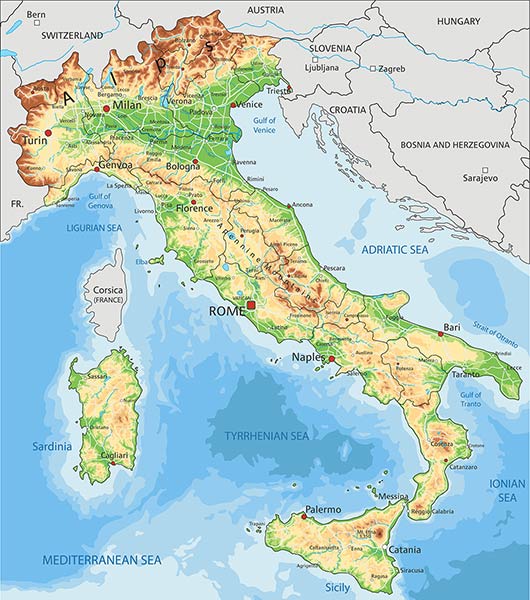By Claudio Guffanti, Founder of Unlimited Views

Diversity, Equity and Inclusion expert Claudio Guffanti. Founder of Unlimited Views – Diversity Management and Coaching in Milan, Italy.
Back when I began to study Diversity and Inclusion topics, I noticed a trend with Italian companies unaware of the intrinsic commercial value that D&I provides. Likewise, I was unable to find training courses in Italy that I considered worthwhile. Therefore, instead, I turned to the US and UK markets for case studies to research, with the latter presenting itself as a European leader and beacon of what was being studied and put into practice abroad.
From this, I founded Unlimited Views. Created with the objective of helping companies effectively approach an array of viewpoints and develop a more successful decision-making process, I support companies’ D&I efforts as a trainer, consultant, and coach.
In recent years, I have observed a growing commitment from Southern European companies concerning D&I initiatives. However, more often than not, these changes occur in the local offices of Anglo-American organizations rather than “home grown” Italian companies.
In any case, the first steps usually consist of smaller D&I projects, entrusted to members of the HR team, regardless of their roles (training and development, employer branding, selection, etc.). Following this, if the company pushes on, seeing the great advantages of such initiatives, a diversity manager is hired. Subsequently, the D&I team begins to grow, albeit remaining within the HR division. This progression can be seen in several Italian companies today.
From my point of view, keeping the D&I team confined within the HR department has two distinct disadvantages. First, there is a risk that attention to its work is limited without a structure in place for direct reporting to the CEO. Second, if D&I remains part of HR, a bias may develop in which D&I initiatives are perceived as devoted to HR activities rather than applied across all departments and activities of the company.
Of course, it is essential to attract a wide array of talents and build a selection process that hires without prejudice, and so Human Resources should be strongly connected with D&I initiatives in order to function effectively. However, this should not detract from the point that other activities within an organization are equally connected. For example, Marketing has a responsibility to develop inclusive products and services to broaden its consumer base, and Procurement and Supply Chain teams may benefit from working with a wide and diverse spectrum of suppliers, from corporate partners to individual freelancers. Moreover, the organization as a whole must be actively involved in both fighting stereotypes and cultivating a leadership mentality that maximizes inclusivity.
For this reason, I believe that forming an independent D&I department is a winning strategy for organizations. This should include resources and investment on par with Marketing, Sales, and HR, and work alongside all departments, at every rung of the corporate ladder. To date, I have only come across two Italian companies that have a chief diversity officer who reports directly to its CEO: Barilla (FMCG industry) and Gucci (fashion industry).
Though I do see progress by certain companies in Italy, many organizations still remain at Step 1—working toward smaller on-off projects. Meanwhile, in the United States, Diversity initiatives are shown to be a useful competitive lever for businesses in the medium- term, backed up with numerous studies by global consulting companies such as McKinsey, Deloitte, and Boston Consulting Group. In this way, the American economy is continuously working on its strategy and action toward key issues, sensing the financial upside that is stimulated through increased creativity, innovation, and talent acquisition. Also, US companies understand that the ethical and social effects of D&I initiatives are positive by-products, with priority and focus remaining on doing business and targeting financial growth.
On the contrary, in Italy, there is a sense that few companies truly appreciate the commercial value brought to the table through investment in D&I. Many organizations continue to consider only the social aspect and not the benefits to their core business.

For this reason, there is a struggle to distinguish Corporate Social Responsibility from D&I. Investments in D&I are scarcer and tend to focus on smaller projects rather than long-term strategies. Then there is another issue: self-referencing. Some companies pride themselves on being extremely inclusive. However, a quick delve deeper and it’s often the case that what is called “inclusion” is in fact “non-discriminatory” practice, without even knowing the difference between the two definitions.
The COVID-19 emergency made it apparent that some progress in the last decades, considered significant, was actually rather sterile. For instance, consider gender equality. It is evident that a period of uncertainty, and distorted perspectives, has greatly disadvantaged women. Taking care of home and family has reversed what was previously achieved, impacting career ambition significantly.
Where is Italy today on its D&I journey? Personally, I believe that there is still a long way to go. Compared to the United States, Italy has indeed encountered ethnic diversity much more recently. But, in the near future, second-generation immigrants, with heritages outside the EU, will be empowered educationally and find themselves competing for management positions against Caucasian men with inherited privileges. Furthermore, society itself is growing in terms of its inclusiveness toward macro-diversities such as the LGBT+ world and the disabled, exerting pressure on corporate organizations to follow suit. In addition, with increasing life expectancy and retirement ages, the workforce is more diverse in terms of age. There are already many examples of colleagues with a forty-year age gap sharing the same work environment.
Ultimately, it is becoming increasingly important to speed up D&I action, so that we are prepared for a new world that will soon find us even more diverse, working together.

Claudio Guffanti
Claudio Guffanti, graduating in Engineering Management at Politecnico, I had the fortune of developing a clear vision of my direction early into my studies: marketing and branding for multinational consumer products.







Ciao Claudio, my wife and I are retired and visit Italia Amata yearly. We met a wonderful young man on our recent trip who is determined to succeed in hotel management despite his humble situation and ethnicity. I came across your article and wondered what advice you might give, including perhaps info re most inclusive international hotel chains in Italy.
Grazie, Robert